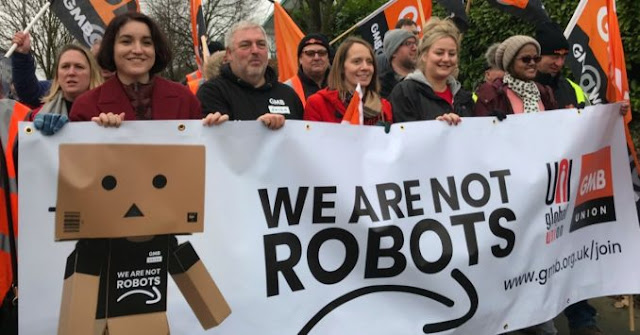Unprepared people (who don't think to have their form-of-payment ready when they arrive at the cashier), slow-minded folks, and self-centered customers (who don't care about their impact on others), are an exponential part of the problem.
Behavior like theirs causes congestion, but the typical over consumerism in the USA causes more vehicular congestion, which is an additional deterrent against going shopping.
As seen above, nobody likes shopping in such environments.
Making it worse is when businesses uncaringly prefer to cheaply hire under-qualified workers (because they accept low wages).
Another form of uncaring cheapness is when corporations stingily resist hiring enough workers... despite building their stores to accommodate plenty of them.
It seems insane, but the majority of retailers in the USA treat their client-facing employees like garbage. Those employers still exude an uncaring superiority from the 1870s Industrial Revolution that workers should be treated as disposable "things". Few of them attempt to have adequate employee retention rates, and most treat staff like seasonal "harvest workers"... excepting them to appear when needed, get no benefits, and leave.
For the career-minded, American retail companies treat them badly. Certainly, it's anticipated that each year, the sales goal will increase. But, American conglomerates cheat their employees by "bait and switch": after being hired, they change the terms. Then, they suddenly add provisos and stipulations that make it harder to achieve the "promised" compensation.
If sales associates work hard to achieve their selling goals, they are then held back by additional "requirements" to open a certain quota of store-brand credit card applications, or warranty subscriptions. Sales professionals are barred from getting paid their sales bonuses when companies force them to achieve extra goals. For example, they say that employees must achieve their sales goals, but will only get paid after they also achieve specific merchandise goals... and sometime also after the store makes it goal, or the entire team makes its goal (which is problematic if you have unmotivated/unskilled coworkers). It's impossible for a store to make its goal when the merchandisers and allocators from the corporate headquarters did a terrible job and did not provide enough merchandise.
An additional restraint to reaching bonuses is when retailers suddenly demand a quota of overtime. Such things are in violation of employment contracts and certain labor laws. Shrewd corporations inflict "mandatory overtime" at the end of the year--when employees strive to make the highest bonuses. They hope to discourage employees to quit before getting paid what is due to them. The American level of overtime is much higher than most other countries.
Another "hoop to jump through", brands prevent employees from getting their bonuses by attaching Customer Survey scores to the mandatory stipulations. Considering the typical rude/demanding behavior of Americans, it forces employees to be cowering/groveling "servants" who tolerate verbal abuses, temperamental rants, and explosions of vulgarity. Please watch this short video for an example...
I agree that levels of "customer service" should be considered when rewarding employees. But I disagree strongly when scheming companies try to be cheap by formulating the surveys to hurt employees. They include many questions about things that employees have no control over. Thus, a hard-working employee might do a commendable job, but consequences originating with the corporate offices will give a bad experience to the client... so they give a low survey score. The following examples should not impact the compensation of a salesperson: "not enough gift boxes", website malfunctions, cashier system malfunctions, product quality, shipping errors from a warehouse/fulfillment center, if a security personnel seems racist, or the simple issue of waiting on a line before entering the store. You might not believe this, but some companies deliberately prepare the wording of the survey to be vague, so "In-store Experience" could attract a bad score without leaving a way for the customer to specify what was wrong. Some companies but a large weight on "Were you acknowledged within 60 seconds of entering the store?" Others let scores be impacted by questions like "Did the employee walk you to the exit" or "Did the employee offer you a complimentary beverage"... which are both challenging to do on a busy day. Customers might not notice the absence of those things... until a survey asks them about it. It's also hard for employees when their stores are perpetually understaffed (due to bad working conditions). When corporations demand employees to maintain monthly survey scores of 95% or higher--to achieve their full bonuses, it discourages them.
The worst aspect is that the American tax system takes 50% of bonuses payouts, whereas other forms of compensation have a lower taxable rate. Therefore, employees who do a great job, struggle through extra requirements, and succeed with full bonuses... lose half of it to the government. Is it worth the strife and stress?
On an epic scale, American companies uncaringly choose to employ unqualified workers (because they cost less) for the Customer Service Departments. It is the same experience at discount chain-stores and luxury "Fashion Houses". Clients might pay four-times the price for something at a luxury brand, but they get the same level of inadequate service as if they were at a bargain-oriented store. Couriers such as Federal Express, United Parcel Service, and USA Postal Service are equally blamed for the same problem.
It is a truth that "high up" in most corporate hierarchies, employees do not care about the messes that are experienced by their customers who suffer issues with their brands/companies.
Restaurant, Hospitality, and Retail employees are usually overworked in the USA (with degrading paychecks per year), so they hate it when customers enter their realms at "closing time". That's also because most of those "customers" don't buy.
In addition to working through holidays (without being given another day off as compensation), retail employees are often compelled to waste time with needless meetings. I'm a fan of purposeful meetings, but too many people don't organize their thoughts and therefore have pointless ones.
Unconcerned attitudes from bosses or at Corporate Headquarters contributes to a high-turnover of employees and a low retention rate. That intensifies problems because an inexperienced workforce is unhelpful. None of those issues are assets, and clients notice.
Remember that Americans must also endure congested traffic, inferior/unreliable public transportation, "road rage", and inadequate infrastructure--just to arrive at a store. Faced with further (and preventable) problems, it discourages them to return; they prefer to shop online.










































No comments:
Post a Comment
Don't be shy: leave your comments :)